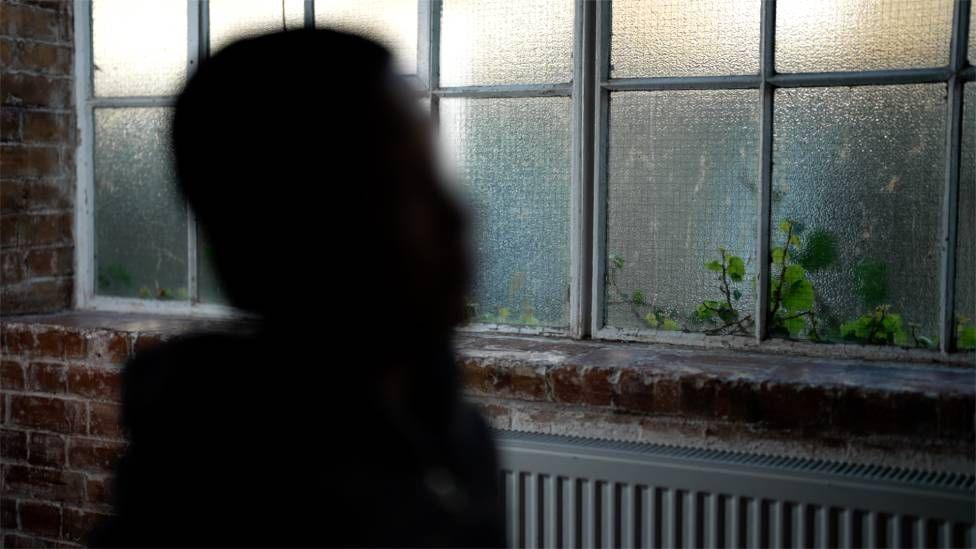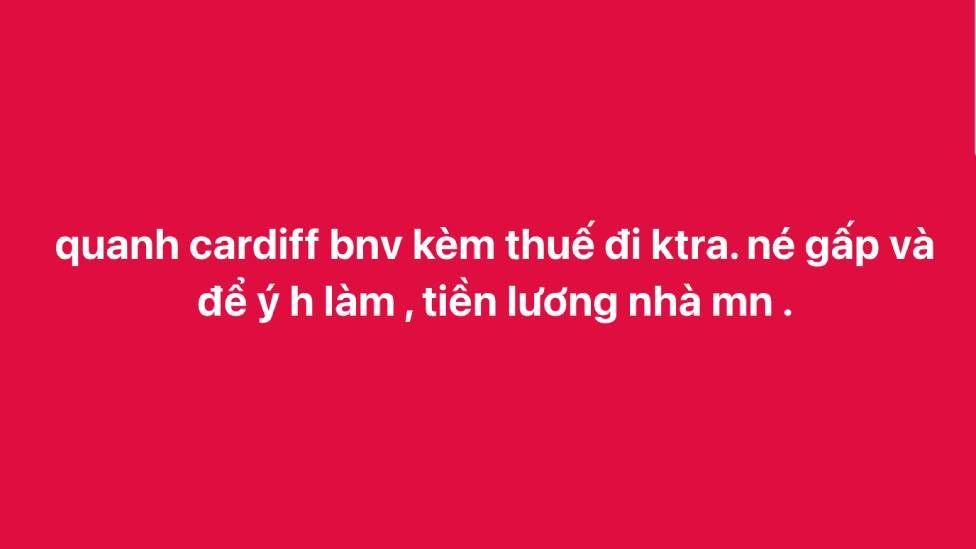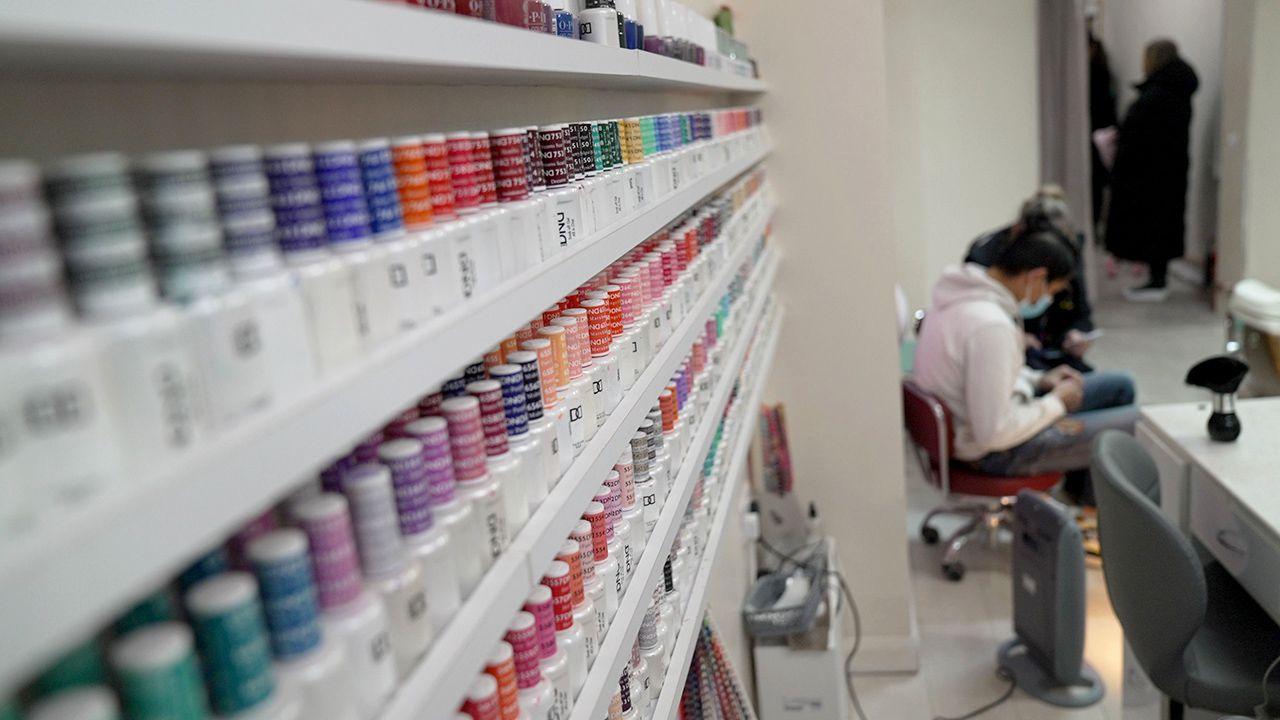Illegal nail bar jobs offered despite clampdown

Enforcement teams have been conducting raids on businesses suspected of employing people illegally
- Published
A BBC investigation has found how, despite a national crackdown, Vietnamese migrants who have arrived in the UK illegally are finding jobs in nail bars and evading detection by authorities.
In a quiet suburb of Port Talbot, immigration enforcement officers are searching for a young Vietnamese woman in a pink tracksuit.
Minutes earlier she was giving a customer a pedicure in a busy nail bar, but ran out the back when officers raided the shop.
The woman was found in a nearby building, and told officers she had arrived in the UK illegally by small boat a few years ago.
"Illegal working is a huge issue for us at the moment," said Richard Johnson, the Home Office's Immigration Compliance Enforcement lead for Wales and the West of England.
"It's not just nail bars, it's all different sectors - there's construction, there's vape shops, there's barbers, restaurants and takeaways."
People smugglers who promoted Tripadvisor-style video reviews caught
- Published22 November 2024
'Major supplier' of people-smuggling boats arrested
- Published14 November 2024
People-smuggling suspect facing extradition bid
- Published22 November 2024
Enforcement teams have been conducting raids in nail bars and convenience stores suspected of employing people illegally across south Wales as part of Operation Tornado, external - a national initiative to tackle illegal employment.
When the uniformed officers visit other premises, it is a similar scene to the one in Port Talbot - people quickly whip off their masks and pretend they are not working there, while businesses deny employing them.
The Home Office said it had ramped up these UK-wide raids this year, carrying out 3,188 visits with 2,299 arrests between 5 July and 31 October 2024 - there were 2,371 visits with 1,836 arrests for the same period in 2023.
"If an employer hires an illegal worker now they can get fined £45,000 for every illegal worker and if they offend again it could be £60,000," said Mr Johnson.
During the week of Operation Tornado penalties worth up to £4m were issued to more than 50 businesses.
However these hefty fines are not deterring everyone.
Many businesses are on high alert, with posts on Vietnamese Facebook groups issuing warnings about raids. Others offer services to keep a look out for officers.
"The Home Office and taxmen have been checking around Cardiff. Everyone, immediately avoid the area," one post read.

A message posted on a Facebook group that translates as: "The Home Office and taxmen have been checking around Cardiff. Everyone, immediately avoid the area. Also take note of your working hours and salaries"
BBC News also came across hundreds of posts from people openly stating they were in the country illegally and looking for nail bar jobs.
Posing as a Vietnamese skilled nail technician in the UK without a visa, a team member called a dozen nail bars to see if they would give her work.
Within an hour she had two job offers.
The employers seemed more concerned about the technician being able to do the job rather than whether they had the documentation to work legally.
Hourly rates varied depending on level of experience - basic skills could earn about £30 per day whereas experienced technicians could make up to £160 per day.
Other businesses said they were not taking on staff without papers as it was "too risky".
More than 30,000 people crossed the Channel in small boats this year, with Vietnam making up the fourth largest group - behind Afghanistan, Iran and Syria - with 3,307 arrivals in the year to September 2024.
Many Vietnamese migrants have told the BBC they came to the UK seeking work because of failing businesses and debts. Their first step, experts have suggested, is often to access Europe by taking advantage of a legal work visa system in Hungary and other parts of Eastern Europe.
Experts told BBC News that many of the people working in nail bars illegally are victims of modern slavery.
"The people who are making the crossing into the UK will often have to pay either through extortion or from being exploited in some form of forced labour or criminality once they arrive," said Jamie Fookes from Anti-Slavery International.

One man the BBC spoke to said it is now harder to find jobs in nail bars and restaurants
During our research we spoke to many working in the so-called shadow economy. One man in Birmingham worked in a restaurant from 09:00 GMT until 23:00, seven days a week and was put up in a house with other illegal workers.
Another man in his early twenties arrived in the UK by small boat and paid about £16,000 to smugglers to make the journey.
When we met the man - who we are calling Nam to protect his identity - he was carrying all of his possessions in a small black bag and had been sofa surfing around the UK for weeks.
"I am in a difficult situation. Jobless. No place to stay. I have to ask friends to let me stay with them," he said.
When he first arrived in the UK, Nam said he worked in cannabis farms, but moved to less dangerous work in nail bars after he was robbed.
He also said the UK smugglers told him "there were lots of opportunities and the living conditions were good".
"When I got here I found that wasn't the case."
He added it was becoming harder to find work.
"I found that things were easier when I just arrived to find jobs in nail bars or in restaurants... However, because there's so many people arriving the UK recently it's become much harder."
Nam now wants to return home to Vietnam.
"My plan is to get a job to start a new, more stable life that would allow me to work and pay back the debts I owe."
Dame Angela Eagle, the UK government's minister for border security and asylum, said: "People who come to the UK and work illegally often in extremely poor conditions are sold a false promise about their ability to live and work here.
"Putting an end to this is part of our Plan for Change to dismantle the criminal smuggling gangs making millions out of small boat crossings and restore order to the asylum system."
Why are Vietnamese people trying to reach the UK?
- Published26 October 2019
Child found in illegal worker raid
- Published31 March 2017
UK modern slavery 'so blatant'
- Published10 August 2018
Get in touch
Have you been affected by any of these issues? Please get in touch using the form below.